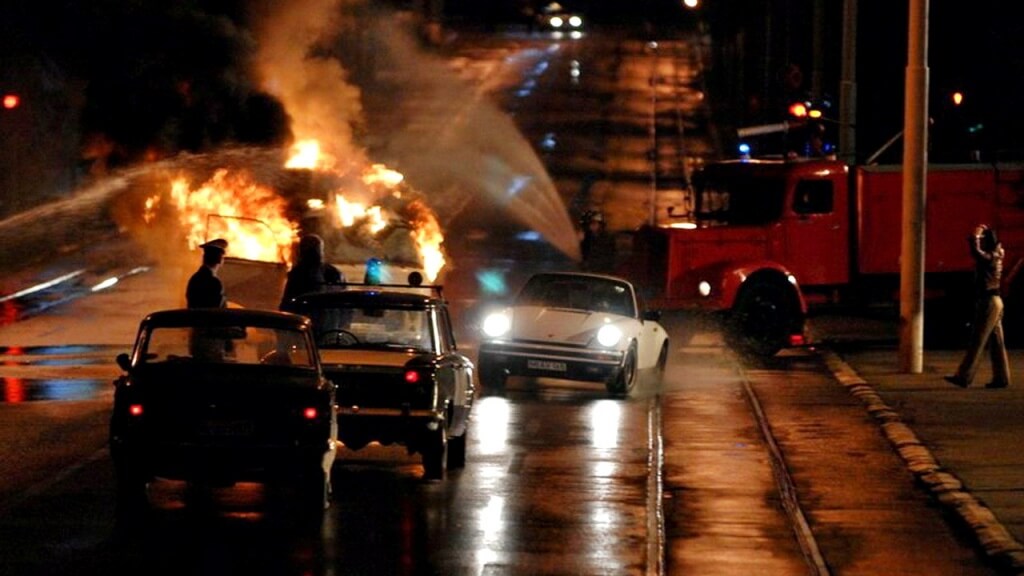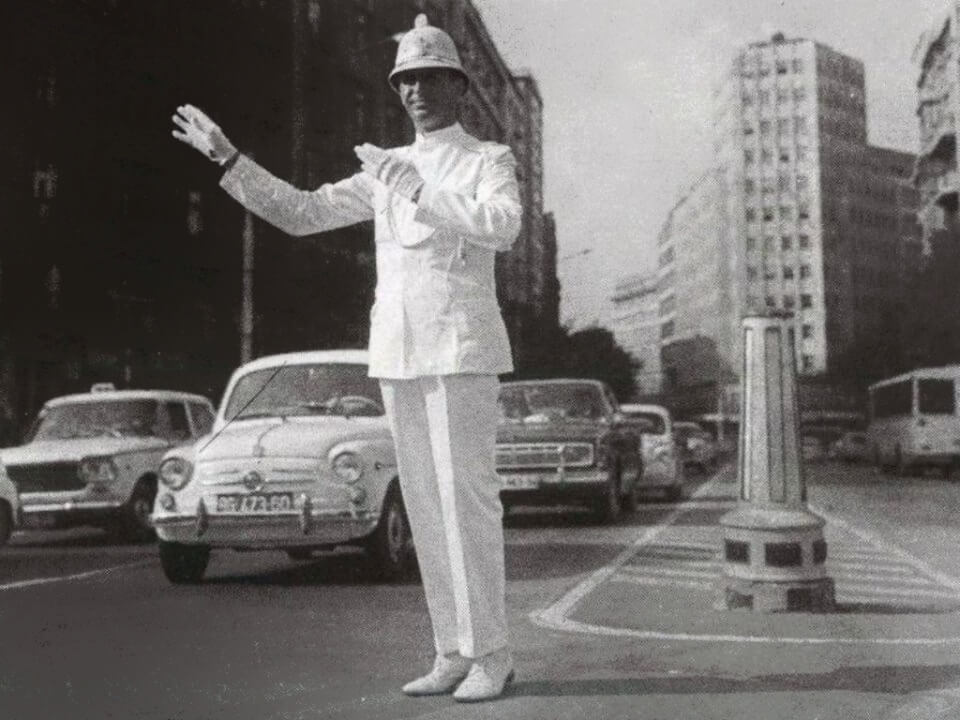History has recorded legendary leaders, heroes and prophets, great poets, three uprisings, priests and educators – but it has recorded few of the insignificant, forgotten and sometimes still extant „Three legends of Belgrade“. Let us now rescue them from oblivion, perhaps even sanctify their memory.
Phantom
For seven days in 1979, throughout Belgrade, stories circulated of a phantom-driver of a white Porsche who drove insanely in the middle of the night. As word spread, many Belgraders missed the last bus to catch sight of the phantom at Slavija Square. He would arrive like an insane vision, driving like mad on two wheels. For seven nights, police on motorcycles and in patrol cars tried in vain to catch him, but he would evade them at the last second.
„The man is not sane“, automobile ace B.B. told newspaper reporters. „ He drives on pure luck! To drive like him, on two wheels, you have to be an experienced driver“. And he offered this analysis: „ As to the question of his state of mind, he is entirely immature!“
Some said that he had gone mad after he had failed his driving exam thirty times; others insisted he was an ex-taxi driver whose working licence had been revoked by the police…“I’m coming“ – he warned the police, and five minutes later there he was on Slavija Square, performing insane circles and daredevil feats.

The Belgrade Phantom
On the seventh night, at precisely one minute and fifty seconds after midnight, spectator’s applause welcomed the show. By this point, the police had caught on and had set up a formidable blockade. Yet, there he was, the automobile Robin Hood, heading straight for a ring of police cars, a line of Public Transportation Service buses and taxies. He tried to make a sharp turn, but rushed into the body of a bus. He vanished instantly into the crowd that had thronged around him, leaving his car upside-down, tires spinning. On this September night, the sevenday-streak of lone Porsche ranger spite came to an end at the bus barricade. Despite differences of opinion regarding his motive, all agreed in one thing: the phantom wore a black baseball cap with an exaggerated peak, the kind that goalkeepers wear in order to protect themselves from the strong sun. Although the police announced several days later that the culprit had been apprehended and convicted, no one believed the news or the modest biography of the petty criminal. Boys from 1979, now middle-aged men, to this day wake up in the middle of the night when the moon is full, go to their windows overlooking Slavija square, and wait to see a ghost-white car and most daring and craziest driver in the history of Belgrade.
Traffic policeman Jovan Bulj
In the mid-sixties, at the busiest Belgrade intersection by the London casino, traffic policeman Jovan Bulj – clad in a neat, white uniform with snow-white gloves – one morning made his first appearance. The sight of him, the elegance of his traffic gestures, was enough to leave Belgraders breathless. His was not the usual way of directing traffic, but something closer to a dramatic ballet in which an unknown policeman plays the role of the white prince or a daring toreador whose tights left marks on passing cars, like bulls in an arena. His movements were charming and graceful, but not feminin; the smile on his face was beatific, a supreme expression of satisfaction with himself and the work he was doing. A traffic violation by a lovely woman was punishable with the wag of a finger by way of warning – similar to how one might reprimand a mischievous child.

Traffic policeman Jovan Bulj
He would also blow kisses. Day after day, Jovan Bulj conquered the hearts of his proverbial difficult-to-tame city. Newspapers began running articles about him and he appeared on television. The mayor of London saw him from a car as he passed the intersection during a visit to Belgrade. The impression left by Jovan was such that the mayor invited him to London. There are stories that the traffic on Trafalgar square never circulated as smoothly as when it was directed by Jovan Bulj, a peasant from a remote province. Londoners, however, never stopped to watch him; his movements were not feminine enough – unlike his London colleagues, many of whom were gay traffic policemen. Still, fame and popularity aside, Belgrade city authorities never liked Jovan Bulj; he attracted too much public attention and passers-by, instead of going about their business, stopped their daily routine to watch a ballet performance. Jovan simply didn’t comply with the authorities view of life and order. In the hierarchy of things, traffic policeman aspired, or should aspire at any rate, to become commanders of road traffic control, then chief of staff, and finally who knows, the traffic minister himself. It was gloriously obvious, however that this traffic policeman wanted nothing more than to stand at the intersection all day and indulge in the passing cars, and that this was in fact a calling that filled him with joy. Jovan made all other jobs seem pale by comparison; he seemed to be the only person in the city who loved what he did, and it was unpardonable. They moved him to a less prominent intersection, but it was no use. Jovan’s impact on the city psyche was profound. In the end, Jovan’s joy forced them to send him into early retirement. He finished his career as a vendor in a newspaper kiosk, and in the end, as the keeper of a remote parking lot.
Even today, his spirit hovers like an invisible ballet dancer above the crossroads by the London edifice, in defiance of the dull traffic lights that have been doing his job for decades.
Shanghai man
Scents of the Orient abound from his plate covered with a white serviette. Almonds, walnut biscuits, sugared grapes, sesame seeds, glazes, quinces..
He started at the Mali Pariz restaurant, visited the Manjež and the Zona Zamfirova, stayed for a while at the Složna Braća, continued on to the Mala Madera and the Madera, and then after he had sold everything, he finally reached the Kosovo, the Boka, Tri Grozda, the Grmeč and the Prozor.
He enjoyed respect and was considered the last of the old-style tradesmen whose entire workshop could stand on the palm of a persons left hand. He knew all the night birds and was witness to many love affairs. He saw how they finished, and how charming girls turned into obese matrons supervising the mixed meat on the grill; he saw how their children grew up willy-nilly, only to repeat the fates of their parents.
When he left his portable trade, there was no one to remember the nights we walked hand-in-hand.
Exerpt from book “A Guide to the Serbian Mentality” by Momo Kapor